This picture is now available from Arrow Video as a “Limited Edition” Blu-ray.
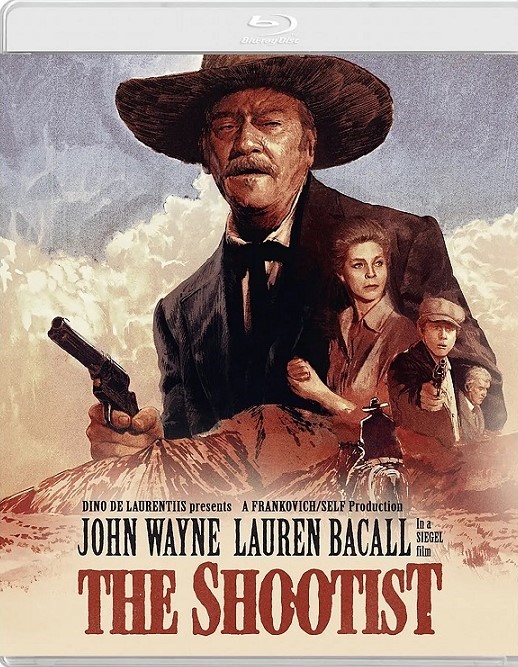
While this reviewer has watched numerous John Wayne films over the years like Stagecoach, The Quiet Man, The Searchers, Rio Bravo, The Man Who Shot Liberty Valance and several others, the actor never made a big impression on me. Frankly, he always seemed to be playing the same character. The Shootist was Wayne’s last film and a title that passed me by. Now, after finally seeing the movie, I feel unlucky that I hadn’t caught up with it sooner and caught the actor doing something a little different. Thankfully, Arrow Video has released a new “Limited Edition” Blu-ray of the film so that all can see a slightly different side of Wayne.
For those, like me, who are new to the picture, the story begins in 1901. The filmmakers immediately note that the term “gunslinger” is a modern invention and that a person who used firearms during this era was actually known as a “shootist”. The days of the old frontier are fading away, with early automobiles and other more modern amenities. Aging “shootist” John Books rides into town towing a large reputation, even if his reason for visiting has nothing to do with his career. He sees old friend Dr. Hostetler (James Stewart), who confirms that the gunman has terminal cancer and, at best, only weeks to live. The doctor prescribes Books laudanum to deal with the pain and suggests he spend his final days at a boarding house run by widow Bond Rogers (Lauren Bacall) and her son Gillom (Ron Howard).
The brusque Books makes an immediate impression and can’t hide his identity for very long. Old enemies seeking revenge like Sweeney (Rochard Boone) as well as those eager to earn fame by killing the famed shootist, including Pulford (Hugh O’Brian) and Cobb (Bill McKinney), quickly come out of the woodwork. As if that wasn’t bad enough, others who learn of his terminal diagnosis attempt to use the man to make a profit, like reporter Dobkins (Rick Lenz) and undertaker Beckum (John Carradine) and the less-egregious Moses (Scatman Crothers), who at least is upfront and pleasant about his transactions with Books.
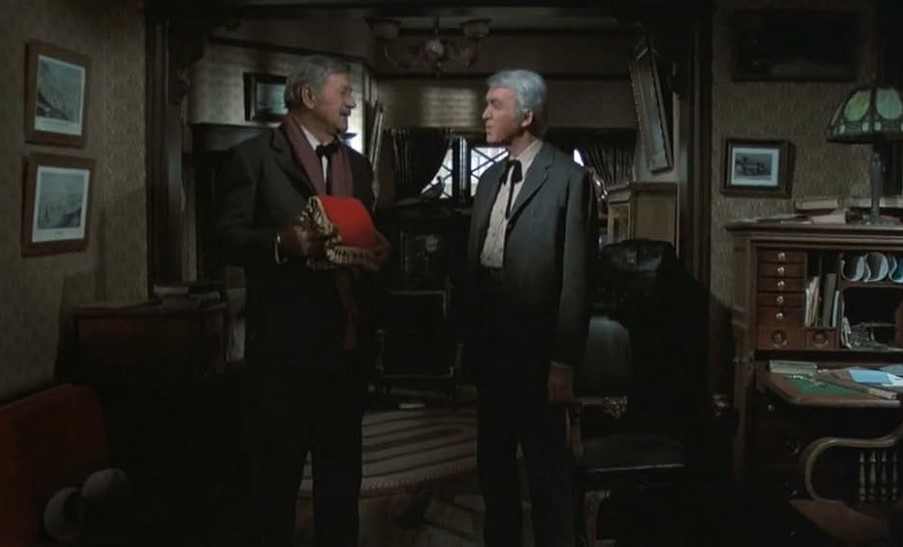
The brutality of his career and finality of things looms large on the mind of lonely Books, so much so that he tries to befriend the widow Rogers. She is sympathetic to the lead but none too pleased by his past, creating some friction between them. Knowing that his era is ending, Books ultimately tries to discourage young admirer Gillom from following too closely in his path. But of course, violence can’t help but follow the protagonist and he also knows that dying in a shootout may be a better way to leave than being bedridden and in excruciating pain.
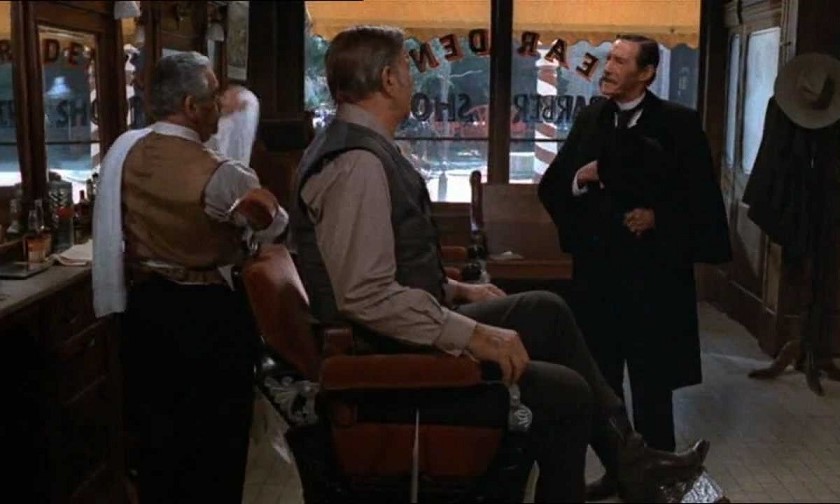
This is a very good film and one that marked Wayne’s final onscreen appearance. He had already lost a lung from cancer and was in ill health (he would succumb to stomach cancer only two years later). The actor’s real-life situation adds great poignancy to his performance as one watches an iconic figure deal with aging and mortality. One can certainly see the old Wayne here, but there is a sadness and humanity in his eyes that lends weight to the performance. As a result, this may be the most sympathetic gunman he has ever played.
The film was directed by Don Siegel (Dirty Harry, The Beguiled, Escape from Alcatraz) who adds a bit of freshness to the proceedings by emphasizing the nastiness of the shootings. When characters get hit, they spout a lot of blood and, unlike earlier westerns, it all looks remarkably violent. The excellent cast, many of whom had previously worked with Wayne, also make an impression.
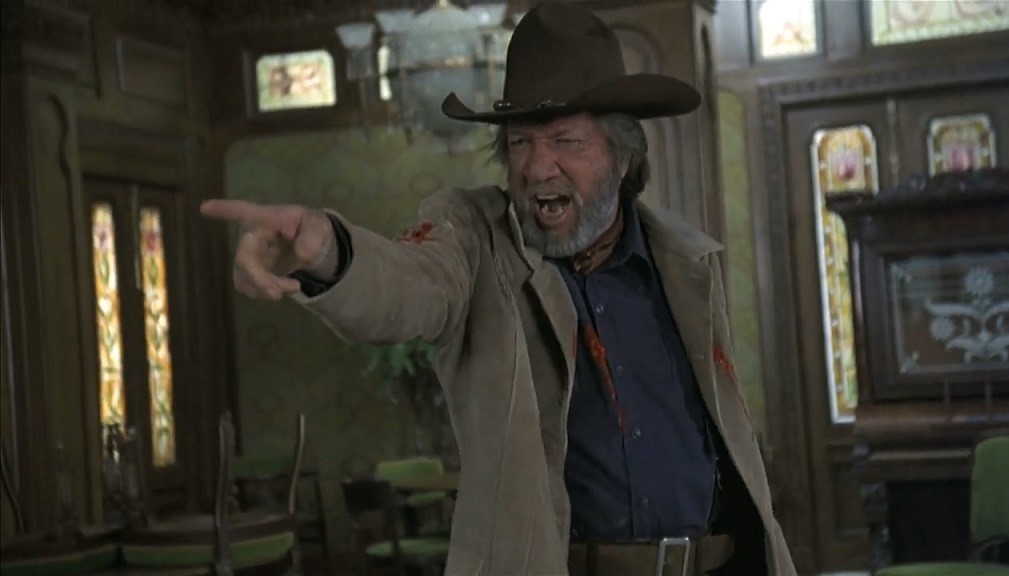
Admittedly, the movie isn’t perfect. While it dispenses with some mythic elements of being a shootist who has killed dozens of men, Wayne is still portrayed in an entirely heroic light who always tries to do the right thing in every given situation. If the film had continued to push and demystify some elements, it might have been a masterpiece. But as it stands, this is still an above-average western with a surprising and unexpectedly wonderful lead performance.
Thanks to Arrow Video, the image here looks sharper than ever before. The film has been given a great new 2K remaster. There is a little bit of grain here and there, but the western vistas (shot on location in Carson City, Nevada) are beautiful to behold. There’s more cold weather and snow than in most genre pictures and as a result the movie has a unique and striking appearance. This Blu-ray also features some dazzling interiors, including an immense bar room set that is wonderfully utilized during the finale.
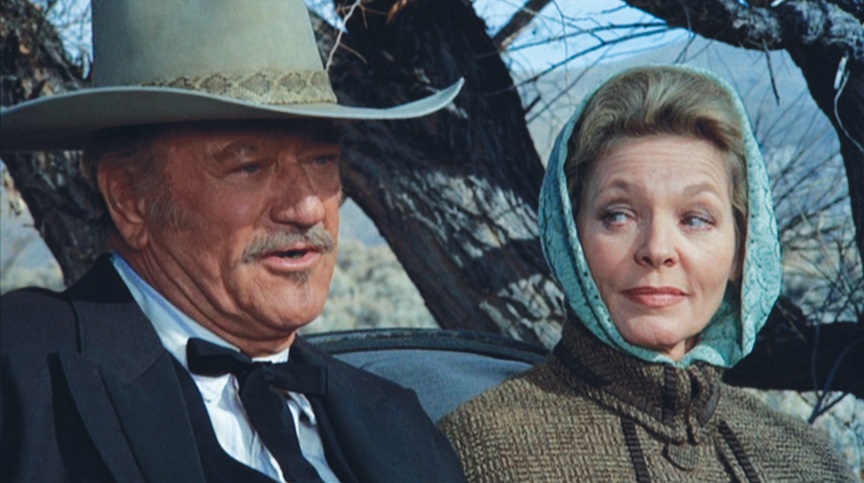
The disc contains some great extras that include a film historian commentary, as well as a couple of visual essays about the picture from other film critics. There’s an archived interview with author C. Courtney Joyner, who knew the screenwriter (as it turns out, the man who wrote the script was the son of the author who penned the book the movie is based on). Also featured is an appreciation of the impressive score for the title that was composed by Elmer Bernstein, a look at the career of John Wayne and more. The disc also contains plenty of publicity materials, as well as a poster, postcard-sized lobby card reprints and other goodies.
For me, the commentary and visual essays on the film are particularly enlightening. As someone who knew very little about the picture going in, there’s a lot of information to be gleaned. Apparently, this production was a tough one, with director Siegel and Wayne having very different visions of the finished feature. They also had very different political views and were constantly bickering throughout the production about the character and approaches to action. Siegel wanted to illustrate the pain of what the main character was suffering from, as well as more accurately depict the violence of the profession. Wayne was said to have found Siegel’s approach vile and in poor taste at times and didn’t want to mess with his onscreen image as much as the director desired. So, Wayne was difficult to handle, often having blowups with Siegel and walking off the set in a huff before returning and apologizing.
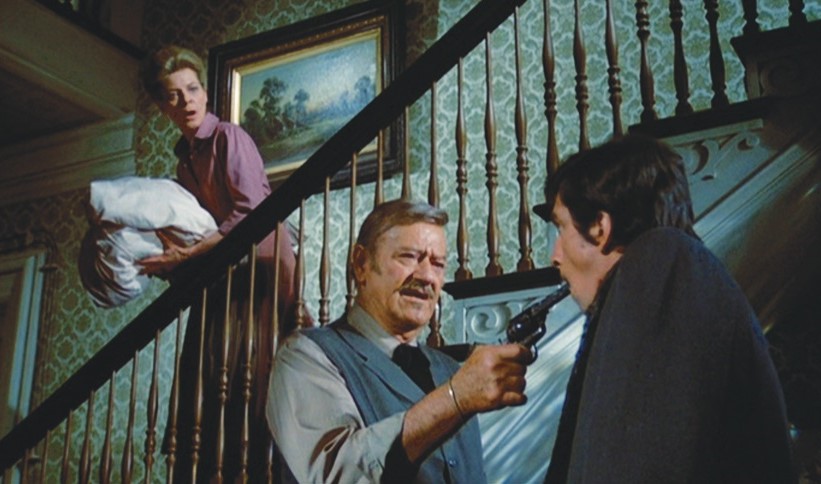
Over the course of the extras, viewers also discover that the tense shoot almost wasn’t even completed. Wayne became sick and the production was nearly shut down as a result. Siegel continued shooting around the actor, using stunt doubles for part of the climactic shootout (which infuriated Wayne), but the director managed to get his star back on the set for a few final shots, including the movie’s most important final close-up for its star.
Viewers learn that Siegel ultimately found it best to pick his battles with Wayne and compromise here and there in order to complete the shoot. That’s why the final product isn’t quite as gritty as intended, but still maintains some of what the filmmaker was going for. Curiously, one of the featurettes notes that George C. Scott was initially going to play the lead role and there was going to be a colonoscopy scene and other frank moments (that you never would have seen in a typical western). However, Wayne ended up campaigning hard for the part. When he got it, some of the more extreme material was toned down (and there were further cuts as a result of the actor.
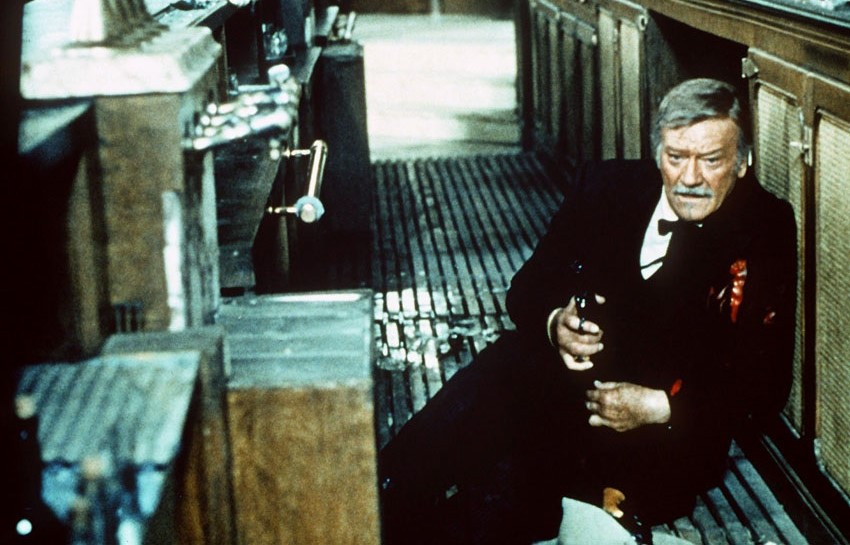
There are even more interesting details about the movie, including the fact that the star’s family ultimately found the final product difficult to watch, because they felt like they were seeing the real Wayne onscreen in many scenes, with the performer actually living with the same disease that would ultimately take his own life.
When The Shootist was released, it earned a lot of positive press and was even put on the American Film Institute’s 10 Best Films of 1976 list. Unfortunately, the movie wasn’t as big of a hit as hoped for and faded away faster than anticipated. No doubt some of this may have been due to the fact that the star and westerns were no longer as big a box office draw as they had been years earlier.
Regardless, the movie holds up quite well. It probably features one of, if not the best on screen performances ever from Wayne. There are a few welcome nods to classic westerns and short but shocking moments of brutality. The climactic shootout featuring the lead attempting to go out in a blaze of glory is cleverly staged and thrilling to witness. As already emphasized, the image quality is stellar and the disc is filled with great bonuses that chronicle its rough road to the big screen. Western fans should definitely pick up Arrow Video’s excellent new Blu-ray of The Shootist.


